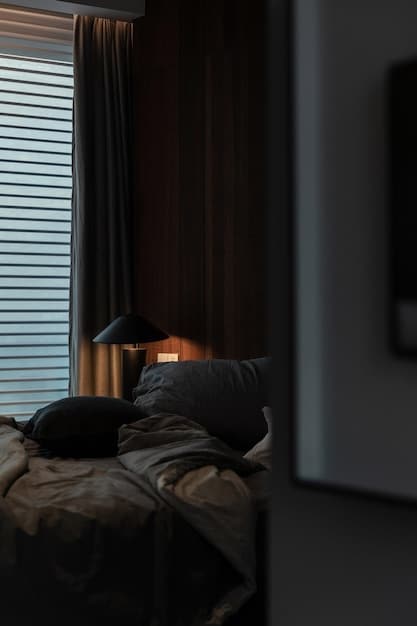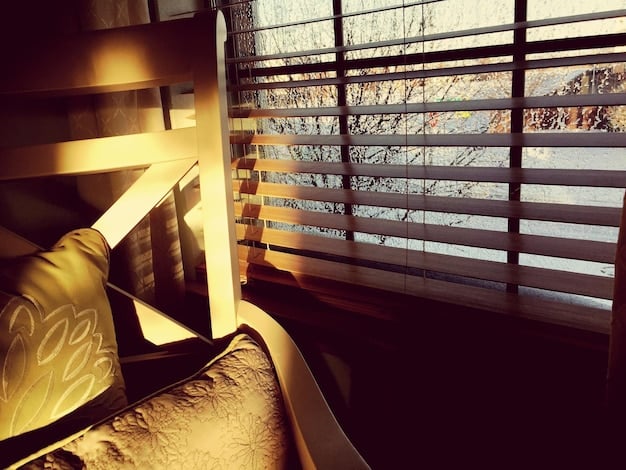Improve Sleep by 20%: Simple Bedroom Adjustments for US Readers

Improve Your Sleep Quality by 20% with These Simple Bedroom Adjustments by optimizing your sleep environment through simple changes to your bedroom, such as temperature control, light management, and noise reduction, which can significantly enhance sleep quality.
Are you struggling to get a good night’s rest? Believe it or not, your bedroom environment plays a crucial role in determining the quality of your sleep. By making a few simple adjustments, you can improve your sleep quality by 20% with these simple bedroom adjustments and wake up feeling refreshed and energized. Let’s explore how to transform your bedroom into a sleep sanctuary.
Optimize Your Bedroom Temperature for Deeper Sleep
The temperature of your bedroom can significantly impact how well you sleep. Finding the right balance can be a game-changer. Let’s dive into how temperature affects sleep and how to optimize it.
Why Temperature Matters for Sleep
Your body temperature naturally decreases as you prepare for sleep. A cooler room facilitates this process, signaling to your body that it’s time to rest. Overheating, on the other hand, can disrupt your sleep cycle.
Ideal Temperature Range
Experts generally recommend a bedroom temperature between 60 and 67 degrees Fahrenheit (15.5 to 19.4 degrees Celsius) for optimal sleep. This range supports the body’s natural temperature regulation process, promoting deeper and more restful sleep.
- 🌡️ Use a programmable thermostat to maintain a consistent temperature.
- 🛏️ Consider a cooling mattress pad or breathable bedding.
- 🌬️ Use a fan or air conditioner to keep the room cool.
Maintaining the right temperature in your bedroom can dramatically improve your sleep quality, helping you fall asleep faster and stay asleep longer.
Block Out Light for a Dark Sleep Sanctuary
Light exposure, especially from electronic devices and outdoor sources, can interfere with your body’s natural sleep-wake cycle. Creating a dark sleep environment is crucial for quality rest. Let’s explore effective strategies for blocking out light.
The Impact of Light on Melatonin Production
Light inhibits the production of melatonin, a hormone that regulates sleep. Even small amounts of light can disrupt melatonin levels, making it harder to fall asleep and stay asleep.
Effective Light-Blocking Strategies
Implementing effective light-blocking strategies can significantly improve your sleep. By minimizing light exposure, you allow your body to produce melatonin naturally, leading to better sleep quality.

- ⚫ Use blackout curtains or shades to block external light sources.
- 😴 Cover electronic devices with tape or move them out of the bedroom.
- 👁️ Wear an eye mask to block any remaining light.
Blocking out light is a simple yet powerful adjustment you can make to your bedroom to promote deeper and more restful sleep.
Reduce Noise for a Peaceful Sleep Environment
Noise pollution can be a significant disruptor of sleep. Creating a quiet, peaceful environment is vital for ensuring you get the rest you need. Here’s how to minimize noise in your bedroom.
Why Noise Impacts Sleep Quality
Noise can interrupt your sleep cycle, preventing you from reaching the deeper, more restorative stages of sleep. Even if you don’t fully wake up, noise can cause micro-arousals that diminish sleep quality.
Strategies for Noise Reduction
Implementing strategies to reduce noise can create a more conducive sleep environment. Reducing noise allows you to fall asleep faster and enjoy uninterrupted rest.
Soundproofing and Sound Masking
Consider soundproofing your bedroom or using sound masking techniques to minimize noise disruptions. These methods can create a more peaceful environment, promoting better sleep.
- 🧱 Use earplugs to block out external sounds.
- 🎶 Play white noise or ambient sounds to mask disruptive noises.
- 🚪 Seal gaps around windows and doors to minimize sound entry.
Reducing noise in your bedroom can significantly improve your sleep, helping you achieve a more restful and rejuvenating night’s sleep.
Optimize Your Bedding for Comfort and Support
Your choice of bedding can play a significant role in your comfort and sleep quality. Selecting the right mattress, pillows, and sheets can make a world of difference. Let’s explore how to optimize your bedding for better sleep.
Choosing the Right Mattress
A good mattress provides the right balance of comfort and support. Depending on your sleeping position and personal preferences, you may prefer a firmer or softer mattress.
Selecting the Perfect Pillow
Your pillow should support your head and neck in a neutral position. The right pillow can alleviate pressure points and promote proper spinal alignment.

The Importance of Quality Sheets
The material and thread count of your sheets can impact your comfort. Choose breathable, soft fabrics that feel good against your skin.
Optimizing your bedding can greatly enhance your sleep quality, making you more comfortable and promoting deeper, more restful sleep.
Declutter Your Bedroom for a Calm Atmosphere
A cluttered bedroom can lead to a cluttered mind, making it harder to relax and fall asleep. Creating a calm, organized space can promote better sleep. Here’s how to declutter your bedroom.
The Connection Between Clutter and Stress
Clutter can create visual distractions and a sense of chaos, increasing stress levels. A tidy environment, on the other hand, promotes relaxation and tranquility.
Effective Decluttering Tips
Decluttering your bedroom can transform it into a serene retreat, promoting relaxation and improving sleep quality.
- 📦 Remove unnecessary items from your bedroom.
- 🧹 Organize your belongings to create a sense of order.
- 🧺 Keep surfaces clear to minimize visual distractions.
A decluttered bedroom can significantly improve your sleep, helping you feel more relaxed and at peace as you drift off to sleep.
Establish a Relaxing Bedtime Routine
A consistent and relaxing bedtime routine can signal to your body that it’s time to wind down and prepare for sleep. Creating a routine that works for you can greatly improve your sleep quality.
The Benefits of a Bedtime Routine
A bedtime routine helps regulate your body’s natural sleep-wake cycle, making it easier to fall asleep and wake up at consistent times.
Elements of a Relaxing Routine
Creating a relaxing bedtime routine can significantly improve your sleep. A consistent routine helps regulate your body’s natural sleep-wake cycle, leading to better sleep quality.
Here are some elements of a relaxing bedtime routine:
- 📚 Read a book (not on a screen) to unwind.
- 🧘 Practice relaxation techniques, such as deep breathing or meditation.
- 🍵 Drink herbal tea to promote relaxation.
Establishing a relaxing bedtime routine can significantly improve your sleep, helping you fall asleep more easily and enjoy a more restful night.
Limit Screen Time Before Bed
The blue light emitted from electronic devices can interfere with your body’s natural sleep-wake cycle. Reducing screen time before bed is crucial for improving sleep quality. Let’s explore the impact of blue light and strategies to minimize its effects.
The Impact of Blue Light on Sleep
Blue light suppresses the production of melatonin, a hormone that regulates sleep. Exposure to blue light before bed can make it harder to fall asleep and can disrupt your sleep cycle.
Strategies for Limiting Screen Time
Limiting screen time before bed is a simple yet effective strategy for improving sleep. By reducing exposure to blue light, you allow your body to produce melatonin naturally, leading to better sleep quality.
- 📱 Avoid using electronic devices at least an hour before bed.
- 👓 Use blue light filters on your devices.
- 📖 Opt for reading a physical book instead of using a tablet.
Limiting screen time before bed can significantly improve your sleep, helping you fall asleep faster and enjoy a more restful night’s sleep.
| Key Point | Brief Description |
|---|---|
| 🌡️ Temperature Control | Maintain 60-67°F for optimal sleep. |
| ⚫ Light Blocking | Use blackout curtains and avoid screens before bed. |
| 🤫 Noise Reduction | Use earplugs or white noise to minimize disruptions. |
| 🛏️ Bedding Quality | Choose comfortable mattress, pillows, and sheets. |
Frequently Asked Questions
▼
The ideal bedroom temperature for sleep is between 60 and 67 degrees Fahrenheit (15.5 to 19.4 degrees Celsius). This range helps facilitate the body’s natural cooling process as you prepare for sleep.
▼
Blackout curtains block external light sources, which can interfere with melatonin production. By creating a dark sleep environment, they help promote deeper and more restful sleep.
▼
A consistent bedtime routine signals to your body that it’s time to wind down. It helps regulate your natural sleep-wake cycle, making it easier to fall asleep and wake up at consistent times.
▼
The blue light emitted from electronic devices suppresses melatonin production, making it harder to fall asleep. Limiting screen time before bed helps your body prepare for sleep.
▼
A cluttered bedroom can lead to a cluttered mind, increasing stress levels. A tidy environment promotes relaxation and tranquility, helping you fall asleep more easily and enjoy a more restful night.
Conclusion
By implementing these simple bedroom adjustments, you can significantly improve your sleep quality by 20% with these simple bedroom adjustments. From optimizing temperature and light to reducing noise and establishing a relaxing bedtime routine, these changes can transform your bedroom into a sleep sanctuary, leading to better overall health and well-being.





